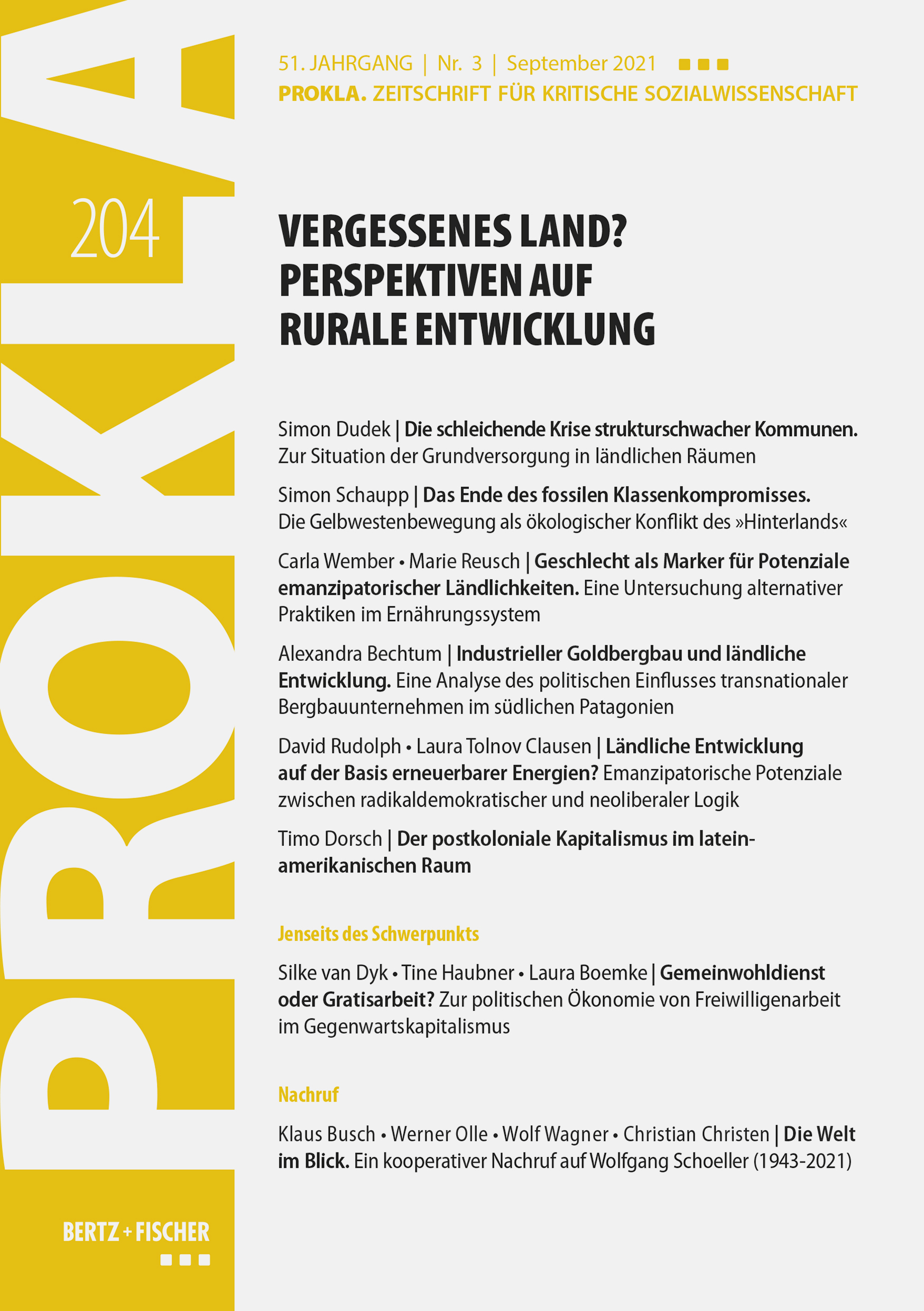Geschlecht als Marker für Potenziale emanzipatorischer Ländlichkeiten
Eine Untersuchung alternativer Praktiken im Ernährungssystem
DOI:
https://doi.org/10.32387/prokla.v51i204.1960Schlagworte:
Landwirtschaft, Geschlechterverhältnisse, alternative Agrarpraktiken, Transformation des ErnährungssystemsAbstract
Der Beitrag fragt nach dem Potenzial alternativer Agrarpraktiken, um geschlechtsspezifische Macht- und Herrschaftsverhältnisse in der Landwirtschaft aufzubrechen. Mithilfe einer Auswertung von Selbstbeschreibungen alternativen landwirtschaftlicher Organisationen sowie ihrer Partnerhöfe und mittels einer Auseinandersetzung mit der Lebensführung dreier Landwirt*innen zeigen wir, dass alternative Agrarpraktiken die geschlechtsspezifisch strukturierten materiellen Verhältnisse in der Landwirtschaft destabilisieren können. Dies schafft Ansätze pluraler Lebensführung in der Landwirtschaft, ohne jedoch herrschaftskritische symbolische Ordnungen zu entwerfen, was die Möglichkeit emanzipatorischer Ländlichkeiten erschwert.
Downloads
Literaturhinweise
Becker-Schmidt, Regina (2013): Konstruktion und Struktur: Zentrale Kategorien in der Analyse des Zusammenhangs von Geschlecht, Kultur und Gesellschaft. In: Graf, Julia / Ideler, Kristin / Klinger, Sabine (Hg.): Geschlecht zwischen Struktur und Subjekt. Theorie, Praxis, Perspektiven. Opladen: 19-42.
BioBoden Genossenschaft (2017): Bodenbrief 2017/02. URL: https://bioboden.de, Zugriff: 02.07.2021.
Bjørkhaug, Hilde (2006): Is there a Female Principle in Organic Farming? An Interpretation of Data for Norway. In: Reed, Matthew / Holt, Georgina (Hg.): Sociological Perspectives of Organic Agriculture. From Pioneer to Policy. London: 195-209. DOI: https://doi.org/10.1079/9781845930387.0195
Brandth, Berit (2002): Gender Identity in European Family Farming: A Literature Review. In: Sociologia Ruralis 42(3): 181-200. DOI: https://doi.org/10.1111/1467-9523.00210. DOI: https://doi.org/10.1111/1467-9523.00210
Burandt, Annemarie / Mölders, Tanja (2017): Nature–gender relations within a social-ecological perspective on European multifunctional agriculture: the case of agrobiodiversity. In: Agriculture and Human Values 34(4): 955-967. DOI: https://doi.org/10.1007/s10460-016-9763-7. DOI: https://doi.org/10.1007/s10460-016-9763-7
Farnworth, Cathy / Hutchings, Jessica (2009): Organic Agriculture and Women´s Empowerment. Bonn.
Fink, Andrea u.a. (2014): Bunter und vielfältiger. Neue Perspektiven für Frauen und Männer am Land. Innsbruck.
Goodman, David u.a. (2014): Alternative Food Networks. Knowledge, practice and politics. New York-Oxon. DOI: https://doi.org/10.4324/9780203804520. DOI: https://doi.org/10.4324/9780203804520
Greven, Michael Th. (1995): Emanzipation. In: Nohlen, Dieter / Schultze, Rainer-Olaf (Hg.): Lexikon der Politik. Band 1: Politische Theorien. München: 67-69.
Jogna, Elisabeth (2011): „Ja halb halb ist es so in etwa… …Nein, du a bissl mehr!“. Geschlechterspezifische Disparitäten in Bezug auf die Arbeitsteilung in bäuerlichen Familienbetrieben in St. Georgen am Walde. In: Jahrbuch der Österreichischen Gesellschaft für Agrarökonomie 20(1).
Keil, Maria u.a. (2019): Zur sozialen Ungleichheit der Lebensführung. Einführende und konzeptionelle Überlegungen. In: Röcke, Anja u.a. (Hg.): Soziale Ungleichheit der Lebensführung. Weinheim: 7-17.
Klinger, Cornelia (2003): Ungleichheit in den Verhältnissen von Klasse, Rasse und Geschlecht. In: Knapp, Gudrun-Axeli (Hg.): Achsen der Differenz. Münster: 14-48.
Knaps, Falco u.a. (2020): Räume nachhaltig entwickeln – Landschaftsbezogene Identitäten als theoretische und praktische Herausforderung für die räumliche Planung. In: Raumforschung und Raumordnung 78(3): 289-304. DOI: https://doi.org/10.2478/rara-2020-0011. DOI: https://doi.org/10.2478/rara-2020-0011
Kreisky, Eva / Sauer, Birgit (1998): Geschlechterverhältnisse im Kontext politischer Transformation. Wiesbaden. In: Dies. (Hg.): Geschlechterverhältnisse im Kontext politischer Transformation. Sonderheft 28 der Politischen Vierteljahresschrift. Wiesbaden/Opladen: 9-49. DOI: https://doi.org/10.1007/978-3-322-97083-1. DOI: https://doi.org/10.1007/978-3-322-97083-1_1
Lettow, Susanne (2019): Dimensions of Emancipation: Rethinking Subjectivity, Domination and Temporality in Feminist Theory. In: Redescriptions: Political Thought, Conceptual History and Feminist Theory 19(1): 9-28. DOI: https://doi.org/10.7227/R.19.1.2. DOI: https://doi.org/10.7227/R.19.1.2
Little, Jo (2003): ›Riding the Rural Love Train‹. Heterosexuality and the Rural Community. In: Sociologia Ruralis 43(4): 401-417. DOI: https://doi.org/10.1046/j.1467-9523.2003.00252.x. DOI: https://doi.org/10.1046/j.1467-9523.2003.00252.x
Little, Jo (2007): Constructing Nature in the Performance of Rural Heterosexualities. In: Environment and Planning D: Society and Space 25(5): 851-866. DOI: https://doi.org/10.1068/d2605. DOI: https://doi.org/10.1068/d2605
Lucius-Hoene, Gabriele / Deppermann, Arnulf (Hg.) (2002): Rekonstruktion narrativer Identität. Ein Arbeitsbuch zur Analyse narrativer Interviews. Wiesbaden. DOI: https://doi.org/10.1007/978-3-663-11291-4
Mayring, Philipp (2015): Qualitative Inhaltsanalyse. Grundlagen und Techniken. Weinheim. DOI: https://doi.org/10.1007/978-3-531-18939-0_38
Oedl-Wieser, Theresia u.a. (2020): Raumstrukturen und Geschlechterordnungen. In: GENDER – Zeitschrift für Geschlecht, Kultur und Gesellschaft 12(1): 30-45. DOI: https://doi.org/10.3224/gender.v12i1.03. DOI: https://doi.org/10.3224/gender.v12i1.03
Oedl-Wieser, Theresia / Schmitt, Mathilde (2016): Rurale Frauen- und Geschlechterforschung. Verortung und Entgrenzung eines Forschungsfeldes. In: Staubmann, Helmut (Hg.): Soziologie in Österreich – Internationale Verflechtungen. Innsbruck: 199-212.
Prugl, Elisabeth (2004): Gender Orders in German Agriculture: From the Patriarchal Welfare State to Liberal Environmentalism. In: Sociologia Ruralis 44(4): 349-372. DOI: https://doi.org/10.1111/j.1467-9523.2004.00281.x
Prummer, Karin (2011): Früchte des Zorns. In: Financial Times Deutschland (19.12.2011).
Saugeres, Lise (2002): Of tractors and men. masculinity, technology and power in a French farming community. In: Sociologia Ruralis 42(2): 143-159. DOI: https://doi.org/10.1111/1467-9523.00207
Schmitt, Mathilde (2012): Die Un_Sichtbarkeit der Frauen im Agrarbereich. In: Jahrbuch der Österreichischen Gesellschaft für Agrarökonomie 21(2): 145-154.
Westfälisch-Lippischer LandFrauenverband e.V./Rheinischer LandFrauenverband e.V. (2016): Frauen in der Landwirtschaft in Nordrhein-Westfalen.






